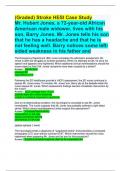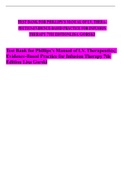Exam (elaborations)
Stroke HESI Case Study Mr. Hubert Jones, a 72-year-old African American male widower, lives with his son, Barry Jones. ( Answered)
- Course
- NURSING
- Institution
- Kansas City Kansas Community College
Stroke HESI Case Study Mr. Hubert Jones, a 72-year-old African American male widower, lives with his son, Barry Jones. Mr. Jones tells his son that he has a headache and that he is not feeling well. Barry notices some left-sided weakness in his father and The Emergency Department (ED) nurse comp...
[Show more]




